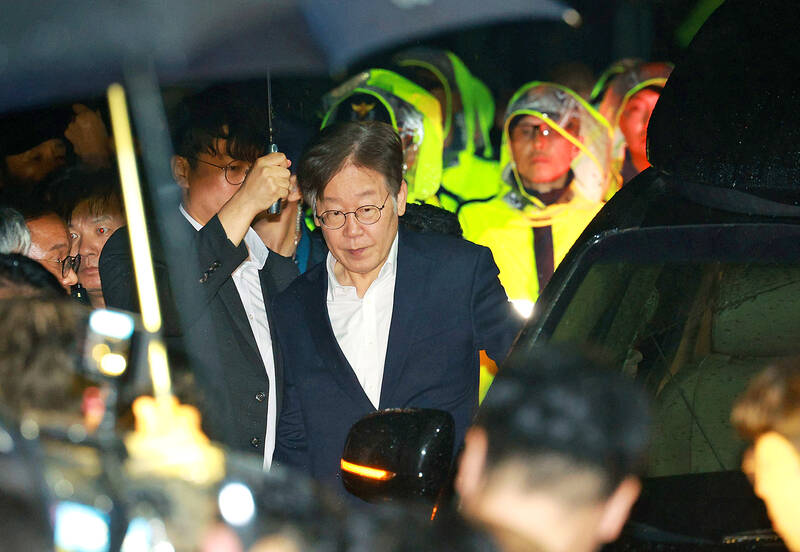South Korea’s opposition leader yesterday avoided arrest when a court dismissed a request from the prosecution for him to be taken into custody pending trial on corruption charges.
Lee Jae-myung, leader of the Democratic Party, still faces trial on charges of bribery in connection with a firm that is suspected of illicitly transferring US$8 million to North Korea.
The 58-year-old is also accused of breaching his duties, which allegedly resulted in a loss of 20 billion won (US$15 million) for a company owned by Seongnam city during his term as its mayor.

Photo: EPA-EFE
Prosecutors last week requested an arrest warrant against Lee, a former presidential candidate.
South Korea’s National Assembly voted to strip Lee of his parliamentary immunity a few days later.
However, in a predawn judgement, the Seoul Central District Court dismissed the arrest request following a nine-hour sitting, which Lee attended.
A judge said that it was “difficult to see that there are grounds and necessity for detention,” adding that there was low risk of Lee destroying evidence due to him being a public figure.
Lee has denied all the allegations against him, saying during Tuesday’s hearing that it felt as though he had become “the enemy of the world.”
He thanked the court for “being the last bastion of human rights,” after it handed down the judgement.
South Korean Minister of Justice Han Dong-hoon said that the investigation would continue.
The court’s decision not to confine him does not mean “Lee is innocent of any crime,” Han told reporters. “The prosecution has been investigating fairly according to the procedure and will continue to do so.”
Lee on Aug. 31 began a hunger strike over what he calls the government’s “incompetent and violent” policies, especially its failure to oppose Japan’s release of treated wastewater from the stricken Fukushima Dai-ichi nuclear power plant.
He returned to a hospital where he had been treated for fasting-related ailments after the court’s judgement, local reports said.
He was hospitalized on Monday last week.

MORE VISITORS: The Tourism Administration said that it is seeing positive prospects in its efforts to expand the tourism market in North America and Europe Taiwan has been ranked as the cheapest place in the world to travel to this year, based on a list recommended by NerdWallet. The San Francisco-based personal finance company said that Taiwan topped the list of 16 nations it chose for budget travelers because US tourists do not need visas and travelers can easily have a good meal for less than US$10. A bus ride in Taipei costs just under US$0.50, while subway rides start at US$0.60, the firm said, adding that public transportation in Taiwan is easy to navigate. The firm also called Taiwan a “food lover’s paradise,” citing inexpensive breakfast stalls

US PUBLICATION: The results indicated a change in attitude after a 2023 survey showed 55 percent supported full-scale war to achieve unification, the report said More than half of Chinese were against the use of force to unify with Taiwan under any circumstances, a survey conducted by the Atlanta, Georgia-based Carter Center and Emory University found. The survey results, which were released on Wednesday in a report titled “Sovereignty, Security, & US-China Relations: Chinese Public Opinion,” showed that 55.1 percent of respondents agreed or somewhat agreed that “the Taiwan problem should not be resolved using force under any circumstances,” while 24.5 percent “strongly” or “somewhat” disagreed with the statement. The results indicated a change in attitude after a survey published in “Assessing Public Support for (Non)Peaceful Unification

PLUGGING HOLES: The amendments would bring the legislation in line with systems found in other countries such as Japan and the US, Legislator Chen Kuan-ting said Democratic Progressive Party (DPP) Legislator Chen Kuan-ting (陳冠廷) has proposed amending national security legislation amid a spate of espionage cases. Potential gaps in security vetting procedures for personnel with access to sensitive information prompted him to propose the amendments, which would introduce changes to Article 14 of the Classified National Security Information Protection Act (國家機密保護法), Chen said yesterday. The proposal, which aims to enhance interagency vetting procedures and reduce the risk of classified information leaks, would establish a comprehensive security clearance system in Taiwan, he said. The amendment would require character and loyalty checks for civil servants and intelligence personnel prior to

The China Coast Guard has seized control of a disputed reef near a major Philippine military outpost in the South China Sea, Beijing’s state media said, adding to longstanding territorial tensions with Manila. Beijing claims sovereignty over almost all of the South China Sea and has waved away competing assertions from other countries as well as an international ruling that its position has no legal basis. China and the Philippines have engaged in months of confrontations in the contested waters, and Manila is taking part in sweeping joint military drills with the US which Beijing has slammed as destabilizing. The Chinese coast guard